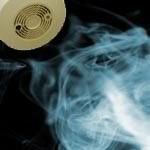Fire Safety
 Anyone with a background in fire prevention can tell you it doesn’t take much to start a fire. One spark, an overlooked ignition source, a simple error, that’s it. Often, this happens when people least expect it or get distracted and think ahead of themselves. They’re not focused on the danger.
Anyone with a background in fire prevention can tell you it doesn’t take much to start a fire. One spark, an overlooked ignition source, a simple error, that’s it. Often, this happens when people least expect it or get distracted and think ahead of themselves. They’re not focused on the danger.With my engineering practice rooted in fire protection, I can attest to some tragic losses. You hear about residence fires, campus dormitory fires, appliances malfunctioning at odd hours, misfortunes that give you pause to consider how at risk we are, and whether we’ve taken ample protective measures ourselves.
Sometimes I think we just take for granted how unpredictable a fire can be—we think it couldn’t happen to us, or that we’ll somehow know when it’s going to happen, or for that matter, be awake when it does. How disoriented would you feel being wakened by a beeping smoke detector to the suffocating tang of char, only to realize the one fire extinguisher you own is in the burning kitchen?
I’ll never forget the impact one incident had on me. An individual had brought work home for the weekend, and early Saturday morning, was in-between tasks of frying eggs and troubleshooting his PC. He lived in a ranch-style house, using a spare bedroom in the back as an office. At some point, he got caught up with the PC and forgot he was making breakfast until he heard the microwave beeping.
When he got to the kitchen, he saw fire climbing the walls from the oven and igniting the cabinets. The microwave was melting, which explained the beeping. And all because he forgot about the burner. He found he could still see the skillet and grabbed the handle, using an oven mitt to lift it. Surprisingly, the fire blew out—all except for a blue flame on the skillet. The front door was only steps away and he figured he could safely discard the grease outside. However, when the door opened, a rush of wind reignited the fire, blowing flames and blistering grease up his arm. He dropped the skillet, turning away, but slipped and fell in the burning puddle.
He sustained 3rd degree burns from his calf, up his side, and down his arm. Skin grafts from one side of his body were taken to use on the other. His recovery took two years. I remember, because I worked beside him every day. He was our Senior Fire Protection Engineer, and a volunteer firefighter.
The point is: this can happen to any of us, even trained professionals. Think before you act. Ensure you have access to more than one fire extinguisher in your home. Store them in different locations. The key is to stay calm. Respond, don’t react. If possible, properly extinguish the fire, just remember it’s easier to remodel a kitchen or build a new home than to grieve a handicap or loss of life.

0 Comments:
Post a Comment
<< Home